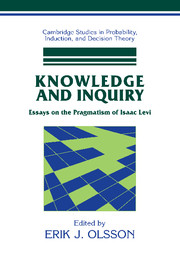Book contents
- Frontmatter
- Contents
- List of Contributors
- Preface
- Introduction: The Pragmatism of Isaac Levi
- 1 Isaac Levi and His Pragmatist Lineage
- 2 Is Pragmatist Truth Irrelevant to Inquiry?
- 3 The Knowledge Business
- 4 Infallibility and Incorrigibility
- 5 Why Inconsistency Is Not Hell: Making Room for Inconsistency in Science
- 6 Levi on Risk
- 7 Vexed Convexity
- 8 Levi's Chances
- 9 Isaac Levi's Potentially Surprising Epistemological Picture
- 10 Isaac Levi on Abduction
- 11 Potential Answers – To What Question?
- 12 Levi and the Lottery
- 13 The Value of Truth and the Value of Information: On Isaac Levi's Epistemology
- 14 Decision-Theoretic Contraction and Sequential Change
- 15 Deciding What You Know
- 16 Levi's Ideals
- 17 The Mind We do Not Change
- 18 Psychoanalysis as Technology
- 19 Levi on Money Pumps and Diachronic Dutch Books
- 20 Levi on the Reality of Dispositions
- 21 Replies
- Index
- References
17 - The Mind We do Not Change
Published online by Cambridge University Press: 05 March 2010
- Frontmatter
- Contents
- List of Contributors
- Preface
- Introduction: The Pragmatism of Isaac Levi
- 1 Isaac Levi and His Pragmatist Lineage
- 2 Is Pragmatist Truth Irrelevant to Inquiry?
- 3 The Knowledge Business
- 4 Infallibility and Incorrigibility
- 5 Why Inconsistency Is Not Hell: Making Room for Inconsistency in Science
- 6 Levi on Risk
- 7 Vexed Convexity
- 8 Levi's Chances
- 9 Isaac Levi's Potentially Surprising Epistemological Picture
- 10 Isaac Levi on Abduction
- 11 Potential Answers – To What Question?
- 12 Levi and the Lottery
- 13 The Value of Truth and the Value of Information: On Isaac Levi's Epistemology
- 14 Decision-Theoretic Contraction and Sequential Change
- 15 Deciding What You Know
- 16 Levi's Ideals
- 17 The Mind We do Not Change
- 18 Psychoanalysis as Technology
- 19 Levi on Money Pumps and Diachronic Dutch Books
- 20 Levi on the Reality of Dispositions
- 21 Replies
- Index
- References
Summary
INTRODUCTION
For many years Isaac Levi has been a staunch defender of a strictly normative and prescriptive conception of rationality. The origin and motivation for this crucial commitment, as it transpires particularly clearly in The Covenant of Reason (Levi 1997; henceforth CR), has been Levi's exploration and development of the Peirce-Dewey “belief-doubt” model of inquiry. On the latter, justifiable change in state of belief is a species of rational decision making. This is what motivates Levi's concern with “rationality” in the first place (CR, 20). In fact, no substantive commitment on what rationality substantively is – or on what it is to be rational – emerges from this theoretical interest. In particular, we are not told what beliefs or values we should have, which ones it is rational to have, or how we should base our beliefs on “evidence.” Rather, principles of rationality are primarily justified instrumentally through their regulative use as formal constraints on well-conducted inquiry and problem solving, no matter the domain, be it science, politics, economics, technology, or art, or even simply the personal decisions we face in daily life. Given their exceeding generality, we can only expect constraints on the coherence of choice to be both formal and weak. Principles of rationality are to be kept immune from revision if a general theory of how rational changes in point of view are to be justified is to be possible at all (CR, 24).
- Type
- Chapter
- Information
- Knowledge and InquiryEssays on the Pragmatism of Isaac Levi, pp. 248 - 265Publisher: Cambridge University PressPrint publication year: 2006



